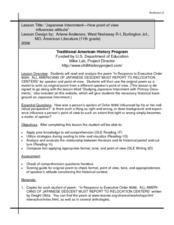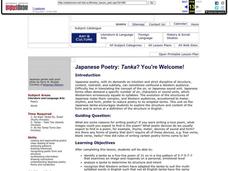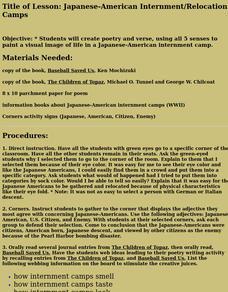Curated OER
Japanese Poetry: Tanka? You're Welcome!
Students analyze Japanese tanka poetry. For this Japanese poetry lesson, students identify analyze the structure of tanka poetry. Students complete the activities at the given links for the lesson and compose two tanka poems.
Curated OER
Japanese Internment--How Point of View Influences Attitude
How does background and experience influence one's point of view? Dwight Okita's famous poem about the Japanese internment is the text used to explore this essential question. Class members study primary documents to gain the necessary...
Carolina K-12
The End of World War II: Pearl Harbor, Japanese Internment Camps, and the Atomic Bomb
The end of World War II saw major events that would forever change the global landscape and international relations. Using a fantastic PowerPoint presentation and several primary source documents, your learners will discuss the...
Curated OER
Japanese Poetry: Tanka? You're Welcome!
Students explore the structure and content of the Tanka form and to arrive at a definition of the structure in English. They analyze a tanka to determine its structure and intent and compose two Tanka; one in traditional form and one...
Curated OER
Say Hi to Haibun Fun
Students examine the Japanese writing form of Haibun. They identify the elements of Japanese prose and poetry, analyze a haibun for writing devices, complete a graphic organizer, and compose an original haibun as a form of journal keeping.
Curated OER
THE OCCUPATION OF KOREA BY JAPANESE IMPERIALIST FORCES
Students read and respond to a history of Korea. In this occupation lesson, students work in groups to research the effects of Japanese occupation and create an illustrated timeline. Students listen to a lecture and write an acrostic....
Curated OER
The Art and History of Japanese Calligraphy
Chinese and Japanese calligraphy is beautiful and significant in both culture and tradition. Engage your class in this expressive fine art form through a lesson on using, holding, and creating brush strokes common to Japanese writing...
Curated OER
Say Hi to Haibun Fun
What is a haibun? With this interesting lesson, writers will experience the Japanese writing form haibun, identify elements important to Japanese writing styles, analyze a haibun, and compose their own. Different from the typical journal...
Curated OER
Famous Person: Yushiko Uchida
Third, fourth, and fifth graders read the book The Bracelet by Yushiko Uchida and examine the events of Uchida's life. They participate in a guided discussion of Japanese culture, perform a reader's...
Curated OER
Japanese-American Internment/Relocation Camps
Students create poetry and verse, using all 5 senses to paint a visual image of life in a Japanese-American internment camp.
Curated OER
You Too Can Haiku
Students explore the country of Japan. In this international studies instructional activity, students utilize their geography skills to locate Japan on a map. Students explore some Japanese customs and communities. Students use...
Curated OER
The Poetry of Chinoiserie
Students study Asian works of art and Japanese haiku. They then take this knowledge and create an original haiku in response to other works of art.
Curated OER
What is a Haiku? How Do You Write a Haiku?
Haiku poetry is explored in this language arts lesson. Yong readers identify the characteristics of haiku and read several examples. Students make connections between their study of Japan and the poetic form of haiku, and they write...
Japan Society
The Bubble Economy and the Lost Decade
Explore Japanese society and national identity. Class members share ideas about the Japanese economy and then investigate a series of resources, including an article, a film, a lecture, and a poem, to learn about Japan's Bubble Economy...
Curated OER
Under the Blood-Red Sun
Fifth graders explore U.S. history by reading an award winning book about World War II. In this Japanese internment camp lesson, 5th graders read the book Under the Blood-Red Sun and discuss the entrapment of Japanese-Americans on our...
Curated OER
World War II: Internment in Hawaii
Students examine world history by writing an essay in class. In this World War II lesson, students identify the attack on Pearl Harbor, the response from the U.S and the effect it had on Japanese-Americans. Students define Japanese...
Curated OER
The Poetry Of Chinoiserie
Students examine works of art that incorporate Asian export objects, and then respond to them using Japanese haiku poems. discuss the subject and meaning in a work of art. They explain the basic ideas behind Japanese haiku poetry.
National Endowment for the Humanities
The World of Haiku
Students complete a study of Japanese culture through haiku. They read and interpret haiku poetry and write haiku of their own.
Curated OER
Be the Poet
Students work through a Haiku Organizer to determine the characteristics they use to write eight haiku poems on a theme that they choose. They design presentation folders of their completed work.
Curated OER
You Too Can Haiku: How to Write a Haiku
Students explore language arts by writing their own poems. For this haiku lesson, students investigate the Japanese culture and their beautiful music, poetry and art. Students count the syllables in every line of a haiku poem and write...
Indiana University
British Literature Restoration Unit: The Pillow Book – Sei Shonagon
First drafted in the year 996, The Pillow Book contains reflections of those met by a lady-in-waiting in the Japanese court. A brief summary, historical context, and discussion questions are provided on the first two pages. Then, two...
Curated OER
Paper Cranes
Paper folding is a great art form that can be incorporated into cultural, mathematic, and art lessons. This resource includes the full instructions needed to fold a paper crane, as well as a Haiku poetry idea. Tip: This activity would be...
Curated OER
Who Were the Dissidents?
Young scholars discover how Japanese dissidents spoke out against the injustice practiced in Imperial Japan. In this Japanese history lesson, students listen to a lecture about the silent dissidents in the nation prior to World War II...
Curated OER
Sadako and the 1000 Paper Cranes
Students read the novel "Sadako and the 1000 Paper Cranes by Eleanor Coerr. They Reaearch Japanese Culture and design a presentation based on information from the Sadako Peace Club link.























